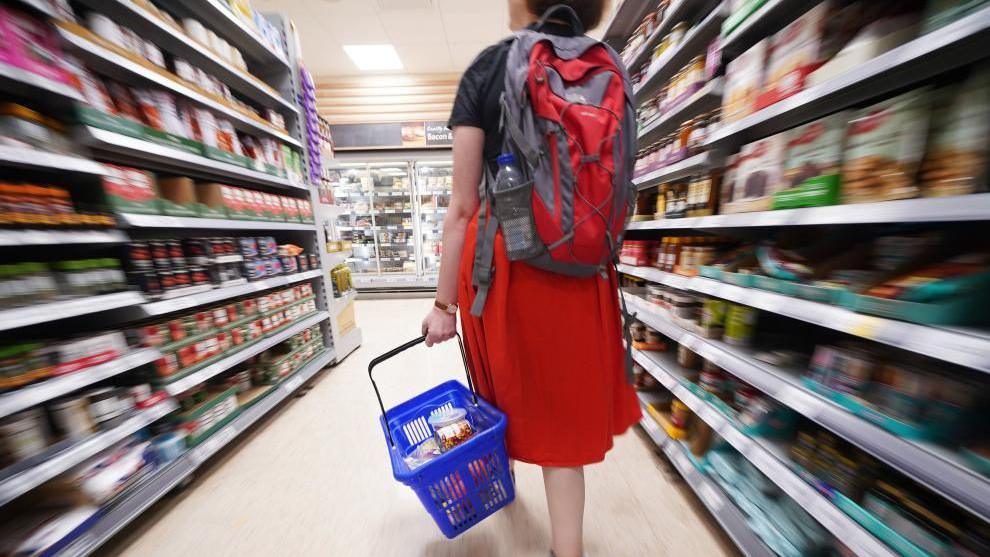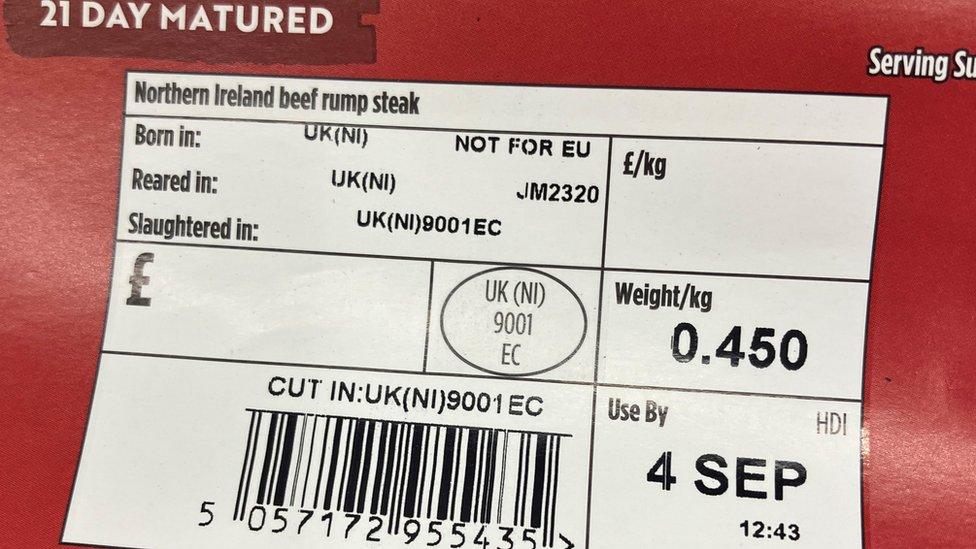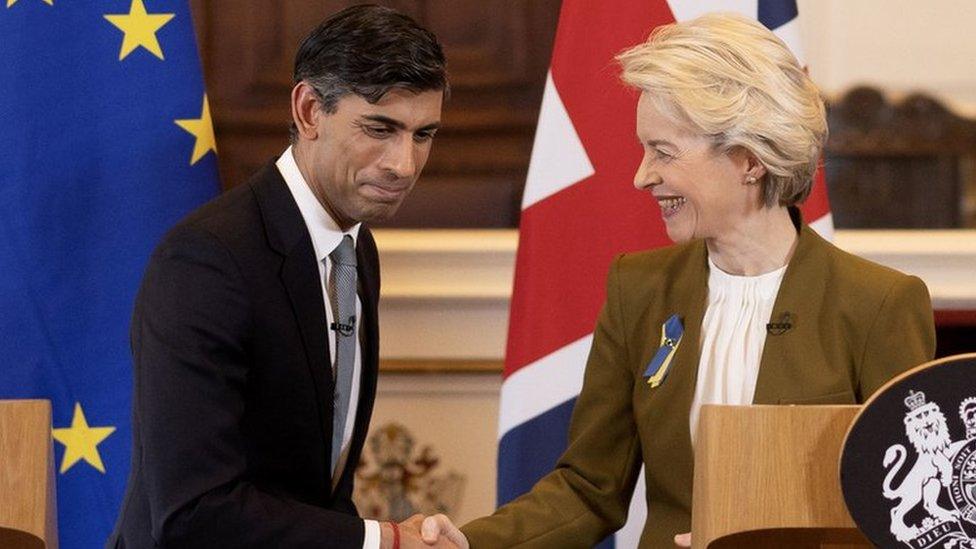Plans for UK-wide ‘Not for EU’ labelling dropped

- Published
The UK government has dropped a commitment made in the last government’s ‘Safeguarding the Union’ command paper, external.
That command paper was central to persuading the Democratic Unionist Party (DUP) to end its Stormont boycott last year.
It included a pledge to legislate so that ‘Not for EU’ food labelling applied to all parts of the UK, not just NI.
That will no longer happen with the government aiming to deliver the same policy outcome without legislation.
The "Not for EU" labels are required in Northern Ireland as part of the UK's deal with the EU to reduce checks on British products entering NI.
The last government had proposed making the labels compulsory in the rest of the UK as way of making sure retailers did not stop supplying products to NI.
Now the government will instead monitor the supply of products to NI and only implement UK-wide labelling if it is clear a problem is developing.
The Safeguarding the Union paper said: "A labelling requirement which applies only to goods on the market in Northern Ireland could create a disincentive for businesses and traders to place goods for sale on the Northern Ireland market.
"The small size of the market means that some suppliers may not have been willing to make the change and may have decided, instead, to remove products from the market."
It went on to promise legislation so that labelling requirements on agri-food products are applied across the UK.
Now after consultation with the UK food industry the government will instead monitor the supply of products to NI and only require UK-wide labelling if it is clear products are being dropped.
Karen Betts, chief executive of the Food and Drink Federation, which represents manufacturers said the move was flexible and proportionate.
She added: "Our members are committed to supplying all our products everywhere across the UK, including to Northern Ireland.
"This more flexible approach will help keep prices down for consumers and help companies manage stock and supplies, as well as removing a barrier to investment in UK manufacturing."
However, some food industry figures have expressed scepticism about the policy change and believe it is inevitable that some product lines will be ‘delisted’ from supermarkets in NI.
They believe that could start to become apparent in a matter of weeks.
There have been fears among some businesses and unionist politicians that requiring a separate label for NI could lead to some products being withdrawn.
The UK government said it welcomed the ongoing commitment of businesses to continue to serve their customers in Northern Ireland.
"Based on that engagement, we will not proceed with the introduction of ‘not for EU’ labelling on a mandatory basis in Great Britain on 1 October 2024.
"We remain committed to ensuring that we safeguard the supply of supermarket supplies into Northern Ireland on an ongoing basis.
"We will work intensively with industry to monitor those supplies and to be assured that they will be maintained as the implementation of the Windsor Framework continues."
'Symptom of wider problem'
The DUP said that the government needs to "provide clarity on its pause of 'Not for EU' labelling" at UK wide level and on how it will ensure suppliers do not withdraw from the NI market.
"Whilst retailer assurances are always welcome the proof will be on what happens and whether suppliers continue to supply the NI part of the UK market", a spokesperson said.
In a statement they said that the publication of wider government guidance for authorities on complying with Section 46 of the Internal Market Act 2020 is "welcomed" but that these issues are a "symptom of the wider problem".
The DUP spokesperson said: "Whilst progress has been made, we will continue to fight to fully restore Northern Ireland’s place within the United Kingdom, including removing the application of EU law in our country and the internal Irish Sea Border it creates".
The party said they will continue to "argue the case for the full primacy of the United Kingdom internal market" and "continue to reject the undermining of its integrity".
Government to help with 'Not for EU' label costs
- Published30 September 2023
First 'Not for EU' posters appear in NI supermarket
- Published28 September 2023
NI businesses concerned over next Brexit phase
- Published24 August 2024
Labels on dairy products
The 2019 Brexit deal for Northern Ireland - known as the NI Protocol - kept Northern Ireland inside the EU single market for goods, which allowed a free flow of goods across the Irish border.
However, it made trading from Great Britain to Northern Ireland more difficult and expensive.
Checks and controls on GB food products entering NI were some of the biggest practical difficulties.
Under a revised deal, known as the Windsor Framework, UK public health and safety standards now apply for retail food and drink in NI.
That means GB traders who are sending food for sale in Northern Ireland face few routine checks and reduced paperwork.
The flipside of this is the introduction of "Not for EU" labels on GB food products, to give an assurance to the EU that these products would not wrongly be sold in its single market.
A second round of "Not for EU" implementation begins in NI on Tuesday, with the labels required on dairy products.
The final stage of implementation is due in July 2025.
Food products produced in NI do not need the labelling because they are still manufactured to EU standards.
Related topics
- Published23 August 2023

- Published21 December 2023

- Published2 February 2024
